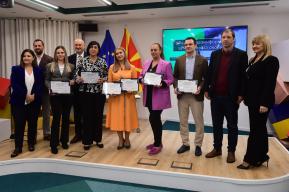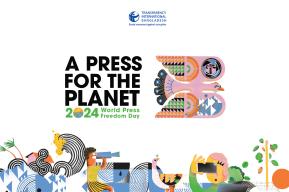News
A Press for the Planet: UNESCO brings scientists, journalists, and students together on advancing environmental journalism in Nepal
In collaboration with the Department of Environment and the Central Department of Journalism and Mass Communication of Tribhuvan University, UNESCO Kathmandu formed a discussion platform called “Advancing Environmental Journalism for Building Informed Communities”. The first discussion was held on 8 May 2024 during the World Press Freedom Day celebration. The platform aims to advance cross-disciplinary learning and equip future generations with the necessary knowledge and communication skills to tackle pressing environmental challenges.
Environmental events happen in the Himalayas can happen anywhere else later. Mountainous communities in Nepal are suffering greatly from climate change, particularly the women, the elderly, and children. Journalists are warriors and they should raise the awareness. I am glad this platform aims to tackle this issue.
This platform plays a crucial role in Nepal’s media landscape, as witnessed by the significant deficiency in the media coverage of climate change within the country. It transcends disciplinary boundaries and serves as a bridge where the scientific community and the media interact and exchange knowledge.
Around the world, journalists face significant threats against reporting on the environmental issues. They are the frontline of democracy, and the press freedom enables citizens to better understand climate change. We hope UNESCO will extend its support to Nepal to communicate its stories to the world.
“Tribhuvan University is honored to collaborate with UNESCO to integrate environmental journalism into our higher education curriculum”, said Dr Kesar Jung Baral, Vice Chancellor of Tribhuvan University, acknowledging the endeavors of UNESCO to form platforms where students are also actively engaged.
Additionally, the workshop featured esteemed experts including Bipul Pokharel, Chairperson of Federation of Nepali Journalists, and These experts highlighted the critical need to develop an informative environmental journalism in Nepal and provide valuable insights and advice.
As a part of the World Press Freedom Day 2024, a photography competition was organized. The top ten winners were awarded and their photos were exhibited at the event.
Storytelling plays a crucial role in environmental journalism. Scientific research is often presented in complex language, making it inaccessible to the public. Journalists should collaborate to translate this research into simple and understandable language for the broader audience. Biodiversity is less known to the public than its counterpart, climate change. We have been sleepwalking through the biodiversity loss crisis in Nepal.
Often, scientific research is formulated technically and is inaccessible to the average citizen. The gap between the scientific research makes it difficult to translate into clear and easy-understandable text to planners and policymakers as well. The workshop aims to inform diverse communities to foster and support Nepal-centric climate reporting, media content production and dissemination.
“The earth is shrinking”, added Dr Ramesh Sapkota, an environmental scientist, “The cases in developed countries may not be relevant to the context of Nepal. Nepali scientists and journalists should focus on Nepal-centric issues and develop knowledge of site-specific environmental problems, thereby addressing policy gaps. Even small changes could make a huge difference”.
As part of its mandate, UNESCO actively collaborates with different stakeholders worldwide and in Nepal to advance environmental journalism. UNESCO’s multi-sectoral platform will keep organizing activities throughout the year to forge connections among researchers, policymakers, and journalists through the facilitation of dialogue and the sharing of diverse perspectives via media campaigns, initiatives, and policy forums. These initiatives endeavour to foster community engagement in climate action for sustainable solutions.
Winning top five photographs
Interviews of environmental journalists
This year, we gained insight into the experiences of three women journalists who specialize in reporting on environmental and climate issues. Our interviews explored their personal journeys, obstacles, and ongoing efforts required from media outlets and the global community.













